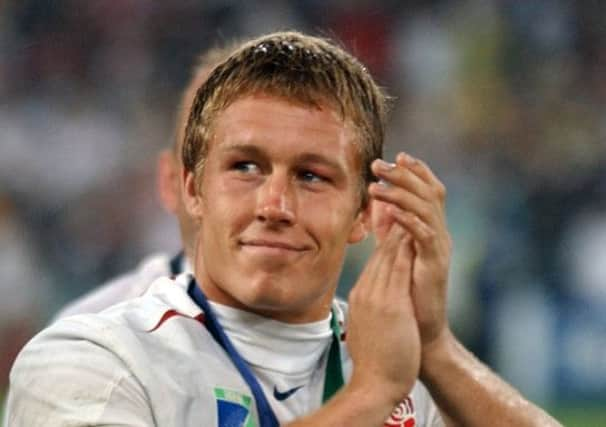Allan Massie: Farewell to trio of greats


So they drift off into a well-deserved retirement and we say “goodbye and thank you”.
There are three notable departures this year: Jonny Wilkinson, Brian O’Driscoll and Dimitri Yachvili. They have a lot in common, not least the fact that, though all have doubtless trained hard and spent time in the gym, they still look like players who might have graced the game in the old amateur days. Meet any of them in the street and you wouldn’t say, “gosh, that’s a man mountain”.
Advertisement
Hide AdAdvertisement
Hide AdWilkinson wasn’t the first hard-tackling fly-half. Even when he first played international rugby at the age of 18 some 15 years ago, it was a long time since the only tackles a fly-half might have to make were in cover defence.
Rob Andrew and Craig Chalmers before him were tackling fly-halves. Wilkinson wasn’t the most naturally-gifted of players. He didn’t float through defences like Barry John or John Rutherford or Dan Carter today. Nor did he have the sort of dizzying side-step that enabled Phil Bennett to make defenders look foolish or Gregor Townsend’s sudden acceleration. But he made himself into a great all-round player whose commitment to improvement was a lesson to all. A natural left-footer, his most famous drop goal to win the 2003 World Cup was struck with his right – or wrong – foot. His bad games were very rare, and teams always thought they had a better chance of beating England if Jonny was missing. He overcame a dispiriting series of injuries, or rather injuries that would have dispirited a lesser man, to enjoy a gold autumn with Toulon, where he became as much the darling of the crowd as he had long been at Twickenham.
O’Driscoll announced his arrival on the international scene by scoring three tries against France to give Ireland their first win in Paris for donkey’s years. He signed off with a victory in the Stade de France which gave Ireland the Six Nations title. In between he not only scored tries against everybody but more or less invented the style in which a centre three-quarter should play in the modern game. He wore No 13 on his back but at the tackle point played as if the number was 7. In his last couple of years, when the edge had gone from his pace, he became a maker of tries for others by means of the half-break and adroit beautifully-timed, often improvised pass, rather than a try-scorer himself.
He was the best centre of his time and the best Irish back since the great Mike Gibson. In fantasy-land I’ve often imagined an Irish midfield of Jackie Kyle, Gibson and O’Driscoll. It would have been as good as any ever fielded by anyone anywhere anytime. The indignation expressed by so many when Warren Gatland dropped him for the final Lions Test last summer was evidence of the regard in which he was held.
The vagaries of French selection being what they are, Yachvili was in and out of the French XV for a decade. He had his bad games, like all scrum-halves, but at his best he ran matches with a nonchalant assurance and languid grace.
I always loved watching him pull the strings. Scrum-halves are often compared to terriers, but Yachvili seemed never to have to hurry. He strolled through matches, though capable of abrupt acceleration when an opening presented itself. Few scrum-halves have read a game better, few have been more inventive.
One of my last and happiest memories of him is of an Amlin Challenge Cup match against Gloucester a year ago. Biarritz won a turnover some ten metres from their try-line. Instead of kicking for safety, Yachvili, spotting an overlap to the right on the other side of the field, threw out a precisely-directed 30 metre pass across the front of the goal. This moment of vision resulted in a length-of-the-pitch try.
Now the bodies of these three heroes have called “Time”; but happy memories remain, and in memory they will all be playing the sublime rugby of their best days.
Solomons passing buck
Advertisement
Hide AdAdvertisement
Hide AdIT’S good to learn from his interview the other day that Edinburgh’s mediocre season is in no way the responsibility of the club’s South African coach, Alan Solomons.
When he arrived only a couple of weeks before the first league match, he found that the players’ pre-season conditioning had been utterly inadequate. Subsequently the southern hemisphere players he recruited were suffering the effects of back-to-back seasons, something, you might think, that might have been anticipated – and this is doubtless why so few of them have made any great impression. Everything, however, will be better this year.
So – though Mr Solomons prudently didn’t offer this hostage to fortune – we may expect Edinburgh to shine in the new second-tier European competition and be in at least the top six of the PRO12 league.